Jacob Zuma clings on – but for how much longer?
South African court rules that a decision to drop 783 corruption charges against Zuma should be reviewed
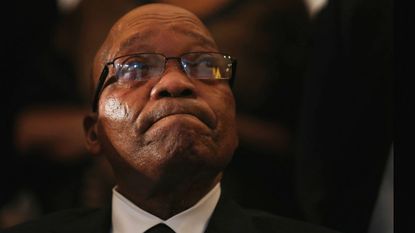
South Africa's High Court has ruled that a decision to drop 783 corruption charges against South Africa's President Jacob Zuma should be reviewed.
The charges had been dropped in 2009 just weeks before the election in which Zuma become president. The presiding judge, Aubrey Ledwaba, said that the decision not to pursue the charges had been "irrational."
Subscribe to The Week
Escape your echo chamber. Get the facts behind the news, plus analysis from multiple perspectives.

Sign up for The Week's Free Newsletters
From our morning news briefing to a weekly Good News Newsletter, get the best of The Week delivered directly to your inbox.
From our morning news briefing to a weekly Good News Newsletter, get the best of The Week delivered directly to your inbox.
"Today is a great victory for the rule of law and ultimately we believe that Jacob Zuma must face prosecution and this judgement certainly affirms the view that we've always held," Democratic Alliance leader Mmusi Maimane said after the ruling.
Zuma has recently survived several challenges that could have ended his seven-year reign, but many analysts believe the accumulation of scandals may still force 73-year-old from office.
Despite a failed impeachment vote earlier this month, calls have been growing for Zuma to resign after he was ordered to pay back millions of dollars of public money used to refurbish his private residence.
Gupta controversy
As well as the 783 corruption charges he may now have to face, Zuma has also been accused of granting undue political influence to members of the Indian-born Gupta family, who have been accused of attempting to "capture the state" to advance their own business interests.
The Gupta brothers, Atul, Ajay and Rajesh (also known as Tony) Gupta, all in their 40s, "are accused of wielding enormous political influence in South Africa," the BBC reports.
In March this year, South Africa's deputy finance minister Mcebisi Jonas claimed that one of the Gupta brothers offered him the position of finance minister, long before Zuma fired the then incumbent, Nhlanhla Nene.
The claim was followed by three similar accusations, two from ruling African National Congress party officials and one from a former director of state power utility firm, Eskom.
Zuma denied the claims, declaring in parliament that "I am in charge" of appointing government officials.
In the aftermath of the scandal, the ANC's National Executive Committee stood by its leader, affirming that it was "fully behind" him.
Public protests
The leader of the Democratic Alliance (DA) opposition party, Mmusi Maimane, said that the impeachment vote failed only because corruption had spread through the ANC "like a cancer".
"The ANC has lost its way and there's no way back," he said.
After the vote, several opposition parties joined together to arrange protests in a bid to force Zuma out, or at least to embarrass the ANC into ousting him.
Led by the DA and the radical Economic Freedom Fighters – a splinter group of the ANC – the protest have been supported by church groups, academics, trade unions and Corruption Watch.
"People are feeling pain, anger and urgency growing," the anti-Zuma alliance said in a statement. "Ever larger numbers of people and organisations insist that Jacob Zuma resign or be removed by the ANC."
"Political parties have failed. Persuasion and appeal has failed. The courts have spoken … now people will have to reclaim our hard won democracy from those who use it for self-interest," the statement said
ANC divisions
Despite the insistence by the NEC that the ANC remains fully behind Zuma, divisions have been reported within the party, as it begins to consider the question of succession.
Zuma has previously been accused of trying to block his deputy, Cyril Ramaphosa, from attempting to position himself as a potential replacement, preferring instead to advocate for his former wife, Nkosazana Dlamini-Zuma.
According to The New Age newspaper, the ANC is divided into a ten-member 'Anti-Zuma brigade', allegedly led by Ramaphosa and party secretary-general, Gwede Mantashe – and 'Team Zuma' which is being led by a number of state premiers.
Approaching the end
Most pundits agree that Zuma is unlikely to complete his scheduled term of office. Some senior ANC officials have publicly admitted that the controversies around the president now weigh heavily on the party itself, and the NEC may act to oust him in a bid to prevent any further political damage being done to the party.
"The markets are giving the ANC the benefit of the doubt," says the South African website Biz News. It predicts that "decisive, positive action will follow"and "the party of Mandela will rediscover its moral compass and do the right thing."
However, despite the High Court's latest ruling, it looks highly unlikely that the ANC will act before the forthcoming local elections, scheduled for 3 August.
Create an account with the same email registered to your subscription to unlock access.
Sign up for Today's Best Articles in your inbox
A free daily email with the biggest news stories of the day – and the best features from TheWeek.com
-
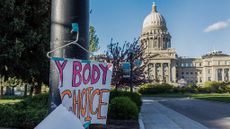 'Horror stories of women having to carry nonviable fetuses'
'Horror stories of women having to carry nonviable fetuses'Instant Opinion Opinion, comment and editorials of the day
By Harold Maass, The Week US Published
-
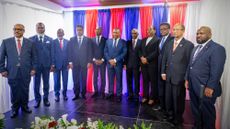 Haiti interim council, prime minister sworn in
Haiti interim council, prime minister sworn inSpeed Read Prime Minister Ariel Henry resigns amid surging gang violence
By Peter Weber, The Week US Published
-
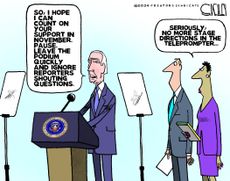 Today's political cartoons - April 26, 2024
Today's political cartoons - April 26, 2024Cartoons Friday's cartoons - teleprompter troubles, presidential immunity, and more
By The Week US Published
-
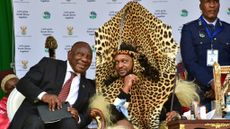 Potential poisoning and succession posturing for South Africa’s Zulu king
Potential poisoning and succession posturing for South Africa’s Zulu kingfeature Conflicting reports over king’s health highlight ongoing bitter power struggles
By Harriet Marsden Published
-
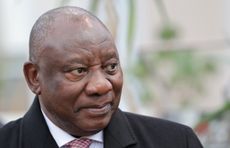 Embattled South African president will not resign, says it is up to political party to decide fate
Embattled South African president will not resign, says it is up to political party to decide fateSpeed Read
By Justin Klawans Published
-
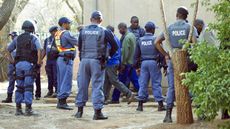 The Week Unwrapped: Africa alert, ticket touts and the words of the year
The Week Unwrapped: Africa alert, ticket touts and the words of the yearpodcast Is South Africa at risk of terrorist attacks? Why are ticket touts in such high demand? And are we really in a ‘permacrisis’?
By The Week Staff Published
-
 ‘FW de Klerk should be given considerable credit for the end of apartheid’
‘FW de Klerk should be given considerable credit for the end of apartheid’Instant Opinion Your digest of analysis from the British and international press
By The best columns Published
-
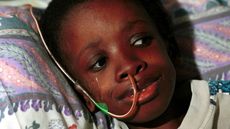 Who is Nkosi Johnson?
Who is Nkosi Johnson?In Depth HIV campaigner who died aged 12 is commemorated by Google Doodle
By Gabriel Power Published
-
 Instant Opinion: Have the Tories reached the ‘end of the road’?
Instant Opinion: Have the Tories reached the ‘end of the road’?In Depth Your guide to the best columns and commentary on Wednesday 11 September
By Gabriel Power Published
-
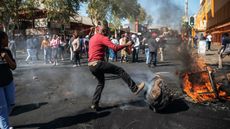 South Africa shaken by xenophobic riots
South Africa shaken by xenophobic riotsIn Depth President Ramaphosa condemns anti-immigrant violence that has prompted backlash across the continent
By Gabriel Power Last updated
-
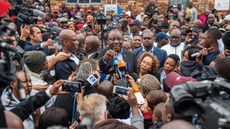 What does the future hold for the ANC in South Africa?
What does the future hold for the ANC in South Africa?In Depth Cyril Ramaphosa is re-elected president but rise of populism poses a real threat
By The Week Staff Published